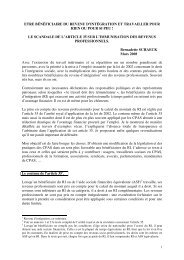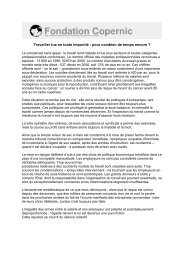Awra Amba RJ 300612 EN - Contacter un comité local d'Attac
Awra Amba RJ 300612 EN - Contacter un comité local d'Attac
Awra Amba RJ 300612 EN - Contacter un comité local d'Attac
Create successful ePaper yourself
Turn your PDF publications into a flip-book with our unique Google optimized e-Paper software.
5. Education<br />
<strong>Awra</strong> <strong>Amba</strong> has paid specific attention to education. It is seen as a key factor of development, not as<br />
a simple way to improve his livelihoods like in the neighbouring comm<strong>un</strong>ities (Ya08/92). It is geared<br />
towards promoting the group, as well as individual (At05/94).<br />
So children must help each other: every child is responsible for the welfare of every other child and<br />
for the welfare of the comm<strong>un</strong>ity children as a whole. Therefore, children help each other in their<br />
studies, care for each other when they go to school and come back, and when they are at school<br />
(At05/94).<br />
Before looking at the relationship of the comm<strong>un</strong>ity with the public education system, we focus<br />
above on an education tool specific to the comm<strong>un</strong>ity: self-help education. Finally, we will assess the<br />
education level of the comm<strong>un</strong>ity, which is a consequence of that and is much higher than the<br />
regional one.<br />
5.1. Self-help education<br />
<strong>Awra</strong> <strong>Amba</strong> had created first a self-education or peer education system. At the beginning, this<br />
system has been implemented to allow women and parents in general to work outside their home<br />
without having to care for their yo<strong>un</strong>g children; then, it became an excellent tool of education for all<br />
comm<strong>un</strong>ity members and of transmission of comm<strong>un</strong>ity values. Children able to walk, those aged 4<br />
or 5, students of primary school between school and meals as well as illiterate adults are encouraged<br />
to enter this education system by older yo<strong>un</strong>g people who have finished primary or secondary school<br />
(At05/90-91; Yi07/60-62).<br />
Children have first a free play period before breakfast. After breakfast and after l<strong>un</strong>ch, their activities<br />
are collective and supervised by an older yo<strong>un</strong>g people. Therefore, children are not left to their own<br />
devices, but are watched, which allows to inform parents about what do their children, and the<br />
parents to follow up on, even to correct their children's education when they are together during<br />
l<strong>un</strong>chtime and during the evening (At05/91).<br />
The comm<strong>un</strong>ity had built firstly a small school in the centre of the village (Crespo, 2012): 64 adults<br />
have this way learned to read and write on the spot through internal training (At05/61), which<br />
corresponds to the number of people who are only able to read and write (in 2005). The need of adult<br />
learning is still important: 97 % of the household heads think they are in great need for learning,<br />
especially in modern weaving and spinning, in general mechanics and wrought-iron, and in joinery<br />
(Ya08/100). Since 2011, night school is given to adults in this small school; it is foreseen to open at<br />
the expense of the cooperative night school for adults in the public primary school as soon as it will<br />
have electricity (Crespo, 2012).<br />
This school has been then converted into a nursery school – or kindergarten, where a woman from<br />
the comm<strong>un</strong>ity welcomes every day children from 8am to 9am and from 2pm to 3pm (see Picture<br />
14). Beyond basic teaching, much education deals with values, standards and principles shared by<br />
the comm<strong>un</strong>ity. At the beginning of each day, children sing a song stating their commitment to<br />
follow the principles of the comm<strong>un</strong>ity (Yi07/61 & 92). Children repeat at any time slogans<br />
reflecting the values of the comm<strong>un</strong>ity (At05/93): "Children do not steal! Children do not lie!<br />
Children do not insult others! Children do respect people! Children do enjoy working! Etc." This<br />
education makes children more ethical, more respectful of others, better speaker (Yi07/94). Children<br />
are motivated to read and raise issues, in order to be creative, innovative and capable of building a<br />
better world through their individual and collective efforts (Ya08/92).<br />
63 /85

















